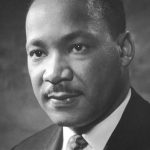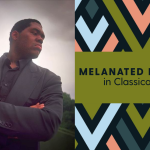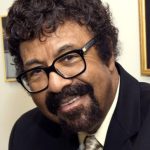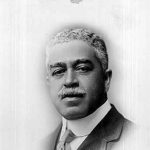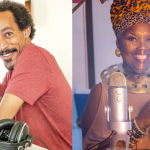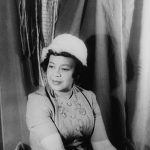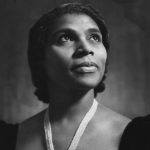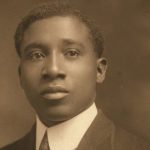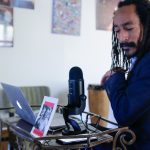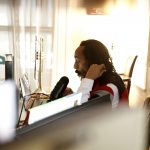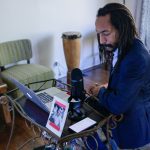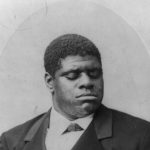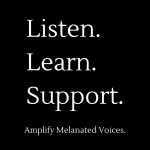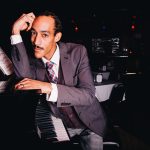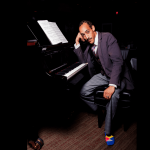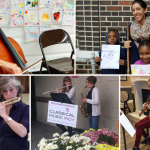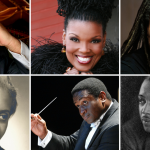MMCM S4E5: Reflections on Roland Hayes with Robert Sims
In this episode, Angela and Joshua welcome scholar, author, and renowned vocalist Robert Sims to discuss the life and legacy of Roland Hayes. An in-depth discussion reveals Sims’ great care in charting Hayes’ pioneering career pathway for Black male vocalists at the turn of the 20th century. Sims’ research also highlights Hayes’ influence on subsequent generations of celebrated singers throughout the 20th and 21st centuries, including himself.
Featured Music:
“Du bist die ruh,” sung by Roland Hayes
“Go Down Moses,” sung by Roland Hayes
“Little Boy,” sung by Robert Sims
“Oh My Lord, Keep Me from Sinking Down,” sung by Roland Hayes and Robert Sims
Angela Brown (00:00):
Before we get started with this episode, we wanted to thank our listeners for your amazing support of this podcast. We can’t wait to bring you future episodes, but we need your support. Just go to givebutter.com/melanatedmoments to help share more stories of exceptional Black artists with thousands of listeners across the US and around the world.
Joshua Thompson (00:27):
And if you’d like more information on each episode, go to our website or follow us on social media.
Angela Brown (00:33):
Follow my foundation on Facebook @MorningBrown or on the web at morningbrown.org.
Joshua Thompson (00:41):
And follow me Joshua Thompson on Instagram as @SockJoplin.
Angela Brown (01:01):
Hey, what’s up my good people. It’s time for another episode of Melanated Moments in Classical Music. I’m Angela Brown.
Joshua Thompson (01:09):
And I’m Joshua Thompson. You know, Angela, we have been bringing some heavy, hitting bangers to the people this season, and I’m pretty sure today’s episode will continue to fit that bill. Am I right?
Angela Brown (01:20):
Child, you got that right baby! Today, I’m bringing you a lyric baritone that has taken up the gauntlet of preserving the legend of one of our trailblazing stars of yesteryear, as well as championing the cause of keeping the African American spiritual alive and well.
Joshua Thompson (01:42):
There you go with them spirituals again. I’m here for it. It’s intriguing. Who might you be speaking of?
Angela Brown (01:48):
Well, you know, the spiritual is the motherboard of all American music, so I gotta keep bringing it up. Joshua, we are interviewing Robert Sims, lyric baritone on his career and on the life and times of Roland Hayes. Mr. Robert, welcome to Melanated Moments in Classical Music!
Robert Sims (02:09):
Thank you. It’s so wonderful to be with you today and you all sound like you have a lot of fun on this podcast, so I’m looking forward to the fun!
Joshua Thompson (02:18):
We do. You know, we ain’t got nothing else to do today, but sit around and hang out with some fun people. So this is what we do. We’re happy to have you.
Angela Brown (02:25):
Yes, so now Robert, tell us a little bit about you, where you are from and what some of your, some people that have encouraged you and intrigued you and, and sparked this love of singing classical music.
Robert Sims (02:44):
Well, uh, Robert Sims, I was born in Chicago, raised in Southern California. I went back to Chicago and now I kind of live in both places. I live in Chicago and, and Northern California.
Angela Brown (02:58):
Okay.
Robert Sims (02:58):
And, uh, you, you and I were just in Chicago when we were doing the reenactments for the Marian Anderson PBS special that debuted a couple of nights ago.
Joshua Thompson (03:08):
Yes. It was awesome. It was awesome.
Robert Sims (03:10):
You know what, it’s so, so wonderful that, um, we are putting, uh, heroes and sheroes, African American heroes and sheroes, on television and in classical music, uh, that started with Roland Hayes and Marian Anderson was really inspired by the great Roland Hayes. And so I’m happy that, uh, you know, uh, people are getting to know more about us and the more about the positive things. So often you turn on the news and you, you know, they choose what goes on the news, you know?
Angela Brown (03:49):
Yes.
Joshua Thompson (03:49):
Mhmm.
Robert Sims (03:49):
Uh, you know, that we all know that, but, um, I’m happy that they’re choosing to put some positive things about us on the news.
Angela Brown (03:57):
Yes. And, um, um, what I’m also loving about this podcast is that it seems like everyone we interview ends up touching on the next interview and then the next interview, ’cause we’ve already done a podcast on Marian Anderson and having Roland Hayes as the subject this time, knowing that Marian Anderson was inspired by Roland Hayes, it’s just one hand washes the other and that same Sankofa, African proverb, you know, reaching back, looking back, bringing forward. I love it. I love it. So, tell me, what about Roland Hayes really intrigues you and inspires you and inspired you to write a whole book about him?
Robert Sims (04:51):
Well, first of all, um, I didn’t write this book myself. Uh, this was a collaboration between me and a good friend, Dr. Christopher Brooks.
Angela Brown (05:00):
Yes.
Robert Sims (05:00):
And we met, there was an American Opera Association event that took place in New York in the year 2000. And I know that because, uh, my grandmother had passed away. No, I believe it was 2001. My grandmother passed away in the year, 2000. And in that January, 2001, um, I hadn’t sung a note for a few months and I was asked to sing at the American Opera Association where they were celebrating Shirley Verrett, Grace Bumbry, Martina Arroyo, all of the greats, uh, were there Benjamin Matthews was, um, uh, the host of the event, Benjamin Matthews and Betty Allen, both hosted the event, Reri Grist was being honored that day. And, uh, Christopher Brooks had written a book on Shirley Verrett.
Angela Brown (05:51):
Yes!
Robert Sims (05:51):
And so they were there promoting their book. And, um, I was there singing. So we met there in 2001 and then again in 2004, where, um, at a NANM convention.
Angela Brown (06:09):
And NANM is?
Robert Sims (06:10):
The National Association of Negro Musicians. And we say Negro musicians because the, the company is over a hundred years old. And, and that’s what, you know, we were being called back then. You know, we, it, it’s so interesting also while I’ll talk about this, when we talk about the spiritual, because there’s this whole thing, are they Negro spirituals? And I say, we, we sure wanna hold onto what the colonizer called us don’t we?
Joshua Thompson (06:35):
Wait a minute, there’s that! Wow.
Robert Sims (06:35):
So that’s a whole ‘nother episode.
Unison (06:36):
[Laughter]
Joshua Thompson (06:36):
We gonna get that on the, on the after hours on the after set.
Robert Sims (06:44):
Yeah, we’ll talk about that. We’ll talk about that later. Uh, but, uh, I was just so happy to hear, uh, Angela say African American spirituals, and I like to call them African American folk songs, but, but we’ll get to that one. But why Roland Hayes? Well, as a young Black boy that wanted to sing and, um, I didn’t start singing in the church, I started singing by taking lessons. I was a pianist and, um, I could play anything by year. And, um, but when I wanted to sing, my grandmother bought me a tape recorder and, uh, that’s my maternal grandmother. And so I’d sing all the tunes that were on the radio and when my mom would come home from work, I had to rush and say, “Mom, look what I did” and I started playing the recording. She’d say, “Oh honey, that’s awful. You can’t sing.”
Unison (07:40):
[Laughter]
Angela Brown (07:44):
Thanks mom.
Robert Sims (07:46):
Stick to playing the piano, right? So, um, we found a piano teacher that had, uh, a degree in piano and voice. And so she agreed after a year of piano to give me voice lessons. So that was my introduction to singing. My introduction to singing was classical. So when people say, “Hey, Robert, get down and do some gospel riffs,” you know, I learned how to do all that later, but you know, I didn’t grow up. I, I grew up in, um, the Presbyterian church in, uh, California singing onward “Christian soldiers…” So, uh, my introduction to singing was, was formal. And one of the very first songs I was taught because my teacher thought it was important to have a good eval was Deep River because of me. So, um, my introduction was formal and started with spirituals.
Angela Brown (08:40):
Wow.
Robert Sims (08:40):
So I needed to find, uh, a role model. So anyone that looked like me was something that I gravitated, uh, towards. And, um, I would go to this record store in Chicago, which was called Rose Records at the time. And, um, I found these old recordings of Roland Hayes. I also found recordings of, uh, all the great African American artists that we know of today as Shirley Varrett, Grace Bumbry, I’ve mentioned many of them. Interestingly enough, I didn’t find many recordings of Black men. And, and, and we’ll talk about that because what’s so wonderful about today. I can name 25 brothers that are out there singing, having international careers. And that wasn’t something that was happening right in the sixties and seventies. In the sixties, we had, we had George Shirley and we had, uh, Simon Estes starting. And other than that, we had some brothers in Europe that were doing, but, but they weren’t there, wasn’t a great number of opera singers. And Roland Hayes did not have an operatic career. His career was more a concert and recital career as was that of the great William Moorefield because that was the lane for African American men. So, um, there’s a lot to talk about when we, uh, talk about Hayes and we talk about just Black singers, um, a lot to talk about.
Angela Brown (10:16):
All right. So while we are talking, let’s listen to Roland Hayes, singing “Du Bist Die Ruh.”
Music Plays (10:22):
[Roland Hays sings “Du bist die ruh”]
Joshua Thompson (14:38):
Absolutely love that one. There’s so much, uh, so much care that he takes in, in this piece with the articulation and in the phrasing. I thought that was absolutely stunning. Stunning, stunning… you know, Mr. Sims, I, I do have a question. Um, actually I take that back. Usually when I ask a question, there’s like three of them that are embedded in there.
Unison (14:59):
[Laughter]
Robert Sims (15:01):
And please call me Robert.
Joshua Thompson (15:02):
Robert. Yes. Yes. Robert, uh, I just have a question as far as what is the sociopolitical climate, not just in the United States, but globally for Roland Hayes during his career? Um, and then also as you’re, you’re growing up and matriculating through life and, and starting your own, where do the parallels, similarities or differences begin or end for you in, in some of that?
Robert Sims (15:30):
You know, it’s so interesting. We say the more things change; the more things stay the same. And, um, this recording of Roland Hayes’s “Du bist die ruh” was not recorded during his prime. I would say that he was over 50 years old when he did this. And, um, and that is the, because he couldn’t get a good recording contract during his prime. Now Roland Hayes was the toast of the town in the twenties and the thirties. I mean, he was a major celebrity. Basically, a rock star in Europe, but, um, he had made some recordings for, um, a British company and, uh, they didn’t want to pay him what he thought that he was worth, so he destroyed those masters.
Angela Brown (16:22):
Wow.
Joshua Thompson (16:22):
Good for him.
Robert Sims (16:24):
And, and he cut them up with, uh, with, uh, scissors and, you know, you know, singers were dramatic, you know.
Joshua Thompson (16:31):
I was about to say, he bring a little divo to the– [inaudible]
Robert Sims (16:36):
And, um, but then on the other hand, Roland Hayes, like many of, a lot of young brothers today in the, uh, early 1900s -1915, 1916- started his own uh, record company. Oh. And, uh, went into the studio. He was inspired by Caruso. And, uh, he heard that Caruso recording of “Vesti La Giubba, ” Pagliacci, and it changed his life. He, he, he, he then said, this is what I want to do. And, um, so, but a lot happened between that time, you know, Roland Hayes, uh, he’s a young Black man. He had to work, his father who, uh, was enslaved, um, passed away. And he was born in Calhoun, Georgia, but the family moved to Chattanooga. And so Roland Hayes had to work one part of the season. And then he would go to school the next season. So he was working in the fields and that sort of thing during, uh, I’m sure when you are planting the crops and are harvesting the crops, other than that, he was in school. And, um, later he found a job working for a Foundry. Okay. And, uh, to take care of his, his family, his mother, and his, his younger brothers. So he got caught up in a conveyor belt machine at this Foundry that took him through the machine a couple of times.
Angela Brown (18:20):
A couple of times?
Robert Sims (18:21):
Right. A couple of times, a couple of times. And it, it nearly broke every bone in his body. And his mother who had lost several children, thought that when they started bringing, when they brought Roland Hayes home in this full body cast, she couldn’t even stand there because she thought they were bringing home, her child who, and that she would lost another child. Well, Roland Hayes totally healed from that. And, uh, he thought– that he believed that the good Lord healed him so that he could sing. That this was his second, uh, opportunity, you know to really take this singing thing seriously. Because his mother told him, his mother said, “Boy, you wanna sing? White folks don’t want to have somebody Black looking like you singing their music and Black folks don’t want you singing white folks music cuz they can’t understand it anyway.”
Joshua Thompson (19:24):
What’d you say? “The more things change, the more things stay and the same.” Right?
Robert Sims (19:27):
Right. And so, uh, she was like, this singing thing is crazy and I’m not supporting it. You need to keep this Foundry job.
Angela Brown (19:41):
Yeah. Even though it took you through the machine twice!
Robert Sims (19:43):
Even it took you through the machine twice and you know what, they kept up on salary while he was sick. And when he got well, offered him his job back.
Angela Brown (19:51):
Wow.
Robert Sims (19:52):
Okay. So, um, and his mother Fanny was very, very religious, very religious. And really became one of his biggest champions. And so anyway, to, to after Roland Hayes, he decided he would go to school. He wanted to go to Oberlin. So, he started out doing these recital tours in little towns on his way to Oberlin to, to, uh, get in there. Now you know what’s so funny, I love African American art and um, uh, visual art and, and just the late David Driscoll, who, who died, uh, from COVID, uh, this past year, he was that little boy down in the south and he heard, you know, uh, they’re having classes, there’s a university called Howard. So, he made his way up to Howard and, and thought he was just gonna go to class. He didn’t know nothing about doing no audit you know, nothing about, he said, this is college, right? This is college. This is college, I’m going.
Unison (20:53):
[Laughter]
Robert Sims (20:53):
And so he got, so he made his way up there to Howard– Uh, this is David Driscoll– made his way up there to Howard and they said uh-uh, you just can’t go to class and come here, you have to apply, and did you graduate from high school? And you know, what, what all of that. Anyway, David Driscoll ended up becoming one of the greatest artists of our time with African American art and doing exhibits and all that. So Roland Hayes is on his way up to Oberlin. Now he did have a friend that went there by the name of Arthur, um, Arthur Calhoun. And so, uh, Calhoun would come from Oberlin and teach Roland Hayes what he knew. So Roland Hayes is on his way up to Oberlin. Well, he didn’t have enough money to get there. So he, he, he didn’t get too far from Chattanooga. He made it up to Fisk in Nashville.
Angela Brown (21:45):
Okay, okay. You shoot for the moon, you land among the stars!
Robert Sims (21:52):
But Fisk was full of teachers who had graduated from Oberlin. So his teacher, uh, had graduated from Oberlin and so, um, he ended up going there. Now he didn’t have a high school diploma. So they had this thing where, you know, you know, you had normal school back in that time, you know, uh, Tuskegee had a normal school where they would get African Americans up to college level. And then you started your college degree. So you might, instead of being there for four years, you might be there maybe six. You know, so they got you on the level and, and so Roland Hayes is on his way up to Fisk. But that, wasn’t the question that you asked…
Unison (22:34):
[Laughter]
Angela Brown (22:34):
No, it’s okay! We gonna go around this barn a couple times, but listen, what we wanna know is how he then, after he went to school and he was singing and concertizing, how did he come to the spiritual, as his mother music that he performed?
Robert Sims (22:54):
Okay. So, Roland Hayes was like our rapping artist today. And these young musicians today, this man founded a record company in 1914, 1915. And then he went to Columbia, had a thing where you could go in, rent the studio, hire your musicians and make a record. So Roland was like, uh, I’m gonna make this career thing happen. So he’s in there using his money. He was out advertising himself, world famous and, uh, Negro tenor.
Angela Brown (23:37):
Yeah.
Robert Sims (23:38):
And, and, and, and, and, and, uh, he was quite a handsome, uh, Black man kind of short, but he had beautiful clothes, always dressing, really a handsome visage. And so he, he didn’t mind posing for the camera. And he would put his name out there and “World Famous Tenor” he’d put on there and, and he’d advertise in the crisis magazine. And so then the next step was to get his records out. So he got his musicians in there and he would record, uh, on a 78 “Vesti La Giubba” Like Caruso.
Angela Brown (24:16):
Okay.
Robert Sims (24:16):
All right. Which is such an interesting thing because the early- when I read about Caruso, his voice was a very lyric voice in the beginning. It was short and didn’t have a great top, but the more that he sang opera, that voice grew and became richer and bigger, and it stretched on all of that. And I just think what if Roland Hayes, if Roland Hayes had a very lyrical instrument, but he went a different path and singing the recital repertoire for which calls for all this nuance and all that. The recital repertoire is a totally different muscle, all this messa di voce and, and all that. When you, when you stand on the opera stage with that orchestra there, they ain’t thinking about that.
Angela Brown (24:59):
Honey, they will throw you off that stage.
Unison (25:02):
[Laughter].
Robert Sims (25:02):
Let’s stop right here and listen to Roland Hayes singing, “Go Down Moses.”
Robert Sims (25:11):
Okay.
Music Plays (25:11):
[Roland Hayes sings “Go Down Moses”]
Robert Sims (27:27):
Woo now I almost got happy on that.
Joshua Thompson (27:32):
[Laughter] So you can’t help it. Can you, you can’t help it.
Robert Sims (27:34):
I don’t get happy on go down Moses. See, But you know, that that is young Roland Hayes and you hear the baritonal qualities in his voice that, but look at the, at young Roland Hayes singing with that vocal line and sostenuto and just, and, and, and gorgeous vibrato rate, it was all there.
Angela Brown (27:54):
And it was higher in pitch than I’m normally hearing. And I’m normally hearing a bass singing. Uh, so it kinda drags and has that heaviness to it. But this had a lilt and it had like, I could see, uh, Joshua – not you Joshua – but Joshua quit the battle of Jericho, Joshua saying, come on let’s go I’m with Moses and Aaron and everybody else. And we gonna get you. I mean, it just felt like that.
Robert Sims (28:19):
The time that he took down on “way down,” and he took some time that now, you know, that’s a, her, uh, Harry Burleigh arrangement and they were friends, they were friends, they were given concerts in New York. They were give, they- he put a trio together with Marian Anderson, Harry Burleigh and himself. And they would go around singing Elijah.
Joshua Thompson (28:41):
You know, this, this reminds me, we got the Superbowl where they got the Titans of, of my upbringing with Dr. Drey and Eminem and, and Snoop- That’s kinda what this is. Right. You get your heavy hitters and, and you go on tour and you shut it down.
Robert Sims (28:55):
Right. And, and he was doing, he was doing that with a young, uh, Marian Anderson. And here’s the thing, uh, with his record company, he, he couldn’t just record the arias he’d have to put some records out of some spirituals, because that’s what the people, the church people wanted to hear. And he’s advertising in the crisis magazine. So he’d come out, he put a spiritual out. Then he put, uh, an aria out. Then he put another spiritual out. Then he put the duet from “La forza del destino” out. And so his, his repertoire was very, but let me let that “Du Bist Die Ruh” that you played Roland Hayes was about to make his debut in Berlin. And he walked out on the stage and the folks they say, we ain’t letting this Black man come to Berlin and sing the mass. He think he’s gonna come and sing Shubert and Schumann and Brahms and Beethoven here. They came out and they start hissing and booing him. And really hissing him. And he just stood there. And his pianist had been through this before.
Joshua Thompson (30:02):
I’m sure, I’m sure…
Robert Sims (30:02):
So I guess, I guess the thing was when they start hissing and booing you, you just stand there and you change the program. And what do you do? You sing, “Du bist die ruh,” you are my peace. And he would closed his eyes and sing “Du bist die ruh”. And when he would get finished singing, “Du Bist Die Ruh” the folks started applauding and they wouldn’t stop. And they will see Roland Hayes, he had that church background and mama Fanny was all in the church, you know, and Roland Hayes and mama Fanny would travel with him. Oh, no, she was going, keep her boy outta trouble. Fanny. My, my grandmother traveled with me with my early days, singing at the crystal cathedral and my grandmother, that was a opportunity for her to call up this woman that had this boutique. My grandmother didn’t go to the store. She called miss Downing. And she said, miss Downing, Bobby’s having a concert. What you got over there in my size? And miss Downing would bring over four or five dresses and suits and all of that from her boutique. And my grandmother wouldn’t be able to, to make a choice. She’d buy all five of them, knowing that I was singing somewhere else, I love it. And so she she’d buy her dress and grandmama would be on the plane or on the train with me, which was like Roland Hayes as mother was on the train with Roland Hayes. So anyway, they picked Rolland Hayes up on one of these concerts at the end of the concert, they rushed to the stage picked him up, put them on his, their shoulders. And they marched him around the town.
Angela Brown (31:49):
Wow.
Robert Sims (31:50):
So, but, but yes, but see, this is Roland Hayes’s secret people are saying, why did this man with this small instrument, small frame, dark skinned brother, how was he able to make it? Before he’s sang, he would close his eyes. And he would say, father blot out Roland Hayes so that they only see The. So when he was saying “Du bist die ruh” something went through the people. Oh yeah. They didn’t know what a it’s like Leontyne Price, Ms. Price, that singing is just infused with the Holy Ghost. And I don’t mean to sound ignorant, the Holy Spirit. [Laughter]
Joshua Thompson (32:38):
Whatever you wanna call it, you got it. I, I, I wanted to ask you something real quick, Robert, because you you’ve done this wonderful thing of elevating the music while also, um, organically highlighting this very common thread and trend of our culture, which is that village mentality where each teach one, you’re bringing the other one up, right. With Roland and Harry Burleigh and Marian Anderson. And we’re gonna circle back to my, to my original question, where is the parallel in this for you? Because you know, granny’s traveling with you as well. And, and so does this mirror your own experience? And if so, or even if not, how do you take your position now as a scholar, as a vocalist, as a mover and shaker in the industry, what do you hope to, to leave or maybe breadcrumbs for subsequent generations, that goal and that mission that’s bigger than you. What is that for, for Robert Sims?
Angela Brown (33:36):
What makes Robert Sims tick?
Joshua Thompson (33:38):
Yeah. See, Angela always has an easy way, I gotta use 8,000 words just to ask a little question, but listen, that’s all right.
Robert Sims (33:45):
You know, um, I believe what, um, Maya Angelou said to Oprah and to others, you never know what your legacy is going to be. All you can do is, is do your best while you’re here. I thought that, um, I went to Oberlin Conservatory. I went from there to, um, study in Italy. I went from there to, to, um, get a masters at SUNY Binghamton. Why? Because they had an opera company there called Tri-Cities Opera and many people, Cynthia Clarey and, uh, Jake Gardner and Ricky Leach and Marietta Simpson, and all of these great singers were coming out of Tri-Cities Opera, Joy Simpson. I heard the Norma when I was in, in, uh, college. And so, um, I went to Tri-Cities Opera. I had a Black, um, director of opera by the name of Dr. David Farrar who founded Virginia Opera and was the first to, was the first to, uh, direct at, um, at Coven Garden and, uh, many other really prestigious debuts at the first, uh, African American directed city opera. He directed, um, the, uh, Musgrave’s, um, “Mary, Queen of Scots.” And so he was my teacher at Oberlin and, um, he- an African American man trying to, uh, let us know what this field was like. The path had kind of been, the door was kind of open for African American women with Marian Anderson and then Loentyne Price and Reri Grist and, and, and, uh, Mattiwilda Dobbs and Grace Bumbry, you know, the names just come. But at that time, I can’t, I can’t name how many men were, were there. There was George Shirley at the Met and Robert McFaren, but, uh, there was a limit. And so, um, like many, uh, African American men of my generation, um, we had to have teaching positions like, um, wonderful gentleman. And, uh, and I don’t know why his name isn’t coming to me. It’ll come to me later. Um, who taught at Howard and, uh, the William Warfield had a teaching position at Champagne Urbana. And so I was singing. I was singing with Opera Carolina in different and at the Ravinia Festival in Chicago. And, um, this teaching opportunity came up and I thought to myself, oh, does this mean I’m a failure as a, as wait, wait, does this mean I’m a failure as a singer, but then I said, you know what? This singing thing is funny. If I take this teaching job, I can get my teeth fixed and give me some glasses.
Unison (36:39):
[Laughter]
Robert Sims (36:39):
It’s so bad. And then I looked at, uh, George Shirley now, George Shirley had a great, uh, singing career before he started teaching. But, um, and so then I, I took this job and, you know, what’s so interesting. I left all my music books and all of my belongings in a box. I never unpacked. I left them in a box because I said, I can be outta here at any time. And I can. Um, and it’s not gonna take me long to pack. And, uh, and that, that little time turned into 28 years. There was a teacher there that said to me, she said, “You know what, Robert, you come to this job two days a week.” At the one time, I was going three days a week, Tuesday, Wednesdays and Thursdays. Now I do Tuesdays and Thursdays. And, uh, she said, “And you know what? You are here about seven months a year. If you can’t have a career with a job that you go to two, uh, days a week,” I said to myself, I need to whoop my own behind.
Unison (37:44):
[Laughter]
Robert Sims (37:44):
But I can’t– wait, wait, wait, wait. If I, if I can’t, if I can’t try to make this work. And so I couldn’t be gone doing, uh, opera because that takes about a month away. Um, and the school has given me, I did this opera, uh, a couple years ago before COVID called “Freedom Ride,” which was fabulous. With the Chicago Opera Theater, it was a world premier. And I was able, uh, I sang the lead baritone role in that. And which was very, very exciting. And the university, you know, just let me go for that.
Angela Brown (38:14):
Well, can we hear, can we hear?
Joshua Thompson (38:16):
I was gonna say, wanna hear you sing! Can I hear that?
Robert Sims (38:21):
That’s why you have producers to keep this thing going, because I think, I think the podcast lasts for four hours.
Angela Brown (38:27):
No child, you gonna have a hot 20!
Joshua Thompson (38:35):
He said I got space and opportunity and I’m gonna use it.
Angela Brown (38:37):
Let’s listen to Robert Sims singing “Little Boy.”
Music Plays (38:42):
[Robert Sims sings “Little Boy”]
Robert Sims (42:23):
You better sing Robert Sims!
Angela Brown (42:25):
You better saying Robert Sims!
Robert Sims (42:27):
Wait, I get happy on my own singing. That was- that was wait y’all ain’t got the say word. That was pristine. That was gorgeous. You know?
Unison (42:36):
[Laughter]
Joshua Thompson (42:41):
I’m here for it, if nobody else is gonna clap for Robert Sims, Robert, Sim’s gonna clap for Robert Sims!
Robert Sims (42:47):
But wait, wait, wait, wait. And I, and I’m very picky, but you know, the, I did that, that was my first recording. I, I was like Roland Hayes. I was like, I’m gonna do my own recording. I ain’t giving ’em to nobody. I’m putting ’em out on my own label and I’m getting all the money.
Joshua Thompson (43:02):
Ain’t that it.
Robert Sims (43:04):
And that’s the time when you could go on recital tour and have your CDs with you now, they ain’t even got no CD players in the car.
Joshua Thompson (43:14):
Turn back to MP3, sir.
Robert Sims (43:18):
Right. But you, uh, that was pristine. That was gorgeous. I’m far away. I’m, I’m far away from it now. And I can listen to it at different years and I can say go young Robert Sims, go.
Joshua Thompson (43:31):
I think that’s a, a brilliant point, right? Our own ears are more critical. And I love that point of as artists, as people of listeners, the, the utility in coming back to a piece to listen or perform and hearing it differently, giving yourself grace. And yeah, you did that. That’s, what’s up. You did that.
Robert Sims (43:50):
And, and that’s a Roland Hayes, spiritual, one of his favorite spirituals, uh, and one of his most popular spirituals. And I didn’t hear Roland Hayes sing that at first. I heard the great tenor, Charles Holland sing it at first. And then I was later, uh, introduced to Roland Hayes, singing it, and, uh, Florence Quivar singing it as a woman was a really, really, uh, uh, changed. You could hear the different characters And this is a great piece because you, you have these different characters. It’s, it’s kinda like, um, um, it’s yeah. It’s, it’s, it’s, it’s, it’s operatic kind of like a Shayna, but also kind of like “What’s mine father, my father.” You know, you, it, it has the, um, it has the Little Boy it has, uh, the Pharisees. It has the narrator. And so, um, almost like a Schubert. Yes. And, um, so what a great piece, and to be arranged by Roland Hayes in this way, um, for the concert stage, it’s just really remarkable and I’m just happy to, to be able to do that and thanks for playing it.
Joshua Thompson (44:56):
So, so listen, we, we could do this all day, ’cause I, I I’m like we just scratched the surface. However, I know you got stuff to do. I wanna hear there’s- there’s one more didn’t you have one more that’s that’s picked, I wanna get all this music in there and then we can kind of wrap things up, but I understand Angela, this one’s like a really special one for you, right?
Angela Brown (45:14):
Yes. This is a duet that he does with Roland Hayes. And can you tell me why, Robert, you chose to pick this particular spiritual and why you decided to do it the way you did?
Robert Sims (45:27):
Well, most of my concerts and producing as a producer and a singer, I’ve always paired myself with legends. Uh, I’ve done and produced concerts with the great William Warfield, Benjamin Matthews. We had a trio called three generations. I performed duets with Odetta. Uh, I performed with George Shirley and, um, this was my opportunity to perform with Roland Hayes. These were recordings that were not released. Roland Hayes was working on a project and he, these recordings were, um, not released. And so, um, and I’m not someone who grew up harmonizing in church, but when I listened to this, the harmonies just came to me and I just thought, Hey, let me, uh, I wrote out his melody line and I tried to write mine out and, and to see, well, do I have any parallel fifths and all of that? And then I took it to Ysaye Barnwell of Sweet Honey in the Rock. She said, “Robert, nobody cares about the parallel fifth. That’s all for theory just, just sing the harmony and do your thing.” And she listened to it. She said, “Yes, its good. And go on and leave me alone. It’s wonderful.”
Unison (46:37):
[Laughter].
Robert Sims (46:37):
So, so, uh, but it just spoke, spoke to me. Um, and because there was no accompaniment, it was easy for me to do this, uh, as a duet with, with, uh, Roland Hayes. And, um, and so here it is, keep me, keep me, keep me from sinking down, Lord. I don’t care what they do. I don’t care how they feel about me. I don’t care how many folks are, uh, talking about me. And, and, and, and, and, and, and we’ve been taught well to hate each other. So we shoot each other up and don’t, and don’t, uh, appreciate our lives and our brilliance, you know, we would talk well to hate ourselves, but Father, in spite of it all, keep me from sinking down.
Music Plays (47:19):
[Roland Hayes and Robert Sims sing “Oh My Lord, Keep Me from Sinking Down”]
Joshua Thompson (50:14):
Oh man, Robert, you are an absolute wealth of knowledge, as well as, uh, you’re beyond phenomenal as vocalists. So on behalf of myself and our listening audience, we say, thank you for allowing us to just have a moment in your presence to learn about you, your passions and the life in the music of the illustrious Roland Hayes.
Angela Brown (50:40):
Yes, Robert Sims. Thank you. You are a talented gentleman and scholar and we appreciate you. Well, that’s it until next time. I’m Angela Brown.
Joshua Thompson (50:52):
And I’m Joshua Thompson.
Unison (50:55):
And this has been Melanated Moments in Classical Music.
Angela Brown (51:06):
Melanated Moments in Classical Music is a production of Classical Music Indy. Our producer is Ezra Bakker Trupiano. Our theme music was composed by Laura Karpman.
Joshua Thompson (51:19):
Melanated Moments in Classical Music is made possible in part by the Indiana Arts Commission, a state agency, and the National Endowment for the Arts, a federal agency. Additional support comes from the Indy Arts Council and the city of Indianapolis.
Angela Brown (51:35):
Our podcast partners are Morning Brown, Inc. and Symphony Tacoma.
[/su_tab] [su_tab title=”Related Blog Posts” disabled=”no” anchor=”” url=”” target=”blank” class=””]LOCAL CLASSICAL – MELANATED MOMENTS SEASON SIX
As we continue celebrating Black Music Month, this week’s playlist will feature music and artists discussed during the latest season of Melanated Moments in Classical Music. All of season six was recently released and featured vibrant discussions about artists such as Scott Joplin, Hazel Scott, Joseph Bologne, and Kenneth Overton, among others.
LOCAL CLASSICAL – BLACK MUSIC MONTH
In this week’s playlist, we celebrate Black Music Month which takes place in June. It was created by President Jimmy Carter in 1979 to honor and celebrate Black artists’ contributions to music. We’ll be honoring the late Herman Whitfield III, an Indianapolis native who was a gifted pianist and composer. We’ll also hear performances of artists who have been featured in season four of Classical Music Indy’s podcast, Melanated Moments in Classical Music.
LOCAL CLASSICAL – MELANATED MOMENTS
In this week’s Black History Month playlist, we bring you recordings by composers, performers, and artists who have been highlighted in our podcast, Melanated Moments in Classical Music. Melanated Moments is the ward-winning podcast from Classical Music Indy that shines a spotlight on musical works composed by, for, and about Black people.
LOCAL CLASSICAL – HOST OKARA IMANI
Hey, Starshine! This is Okara Imani, Media Production Fellow for Classical Music Indy, and your guide to The “I” in Classical Music. I’m here to highlight the cultural and social intersections of the classical art form, beyond the Classical Period and beyond the constructs of Euro-centric high society origins.
Ric’key Pageot: Inspiring a Moment to Learn, Acknowledge, and Respect
Ric’key Pageot: Inspiring a Mo …
Ignatius Sancho: Composing the Hypocrisy of Colonialism & Convention
Ignatius Sancho: Composing the …
NEW CLASSICAL – DR. BILL BANFIELD
This week we bring you the music of Dr. Bill Banfield. Dr. Banfield is an award-winning composer whose symphonies, operas, chamber works have been performed and recorded by major symphonies across the country. Few have a wider, performed professional composing output, that has had public concert performances, reviews, radio, recordings of some 12 symphonies, 7 opera, 9 concerti, chamber, jazz, and popular forms. This alone making Dr. Banfield one of the most performed, recorded composers of his generation. In 2010 and 2016, Dr. Banfield served as a Pulitzer Prize judge in American music.
#AmplifyMelanatedVoices
Classical Music Indy stands with our Black community. We are here to listen, learn, and lend our support. We believe that classical music is powerful; that it evokes a range of human emotions and creative expression.
Angela Brown Brings her Unbridled Zeal to a New Podcast.
Angela Brown brings her unbrid …
Local Classical – Angela Brown
We continue our Black History Month programming this week with our featured artist, soprano Angela Brown. Born in Indianapolis, Brown has led a world-renowned career as a vocal soloist. Her highly successful Metropolitan Opera debut in the title role of Aida captured instant attention from international print and broadcast media and catapulted Angela onto the world’s prestigious opera and symphonic stages.
Highlighting our Female Performers
Classical Music Indy employs a diverse range of musicians for our events around Indianapolis. In 2016 we hired 95 musicians. Classical Music Indy has dedicated our blog articles to outstanding women musicians this month. We’ve shared about great women music educators in America and about under-recognized women musicians throughout history. This week, we take a look at a few of Classical Music Indy’s top performers – women who are doing great work here and now in the city of Indianapolis. Read below about these incredibly talented musicians, and hopefully you’ll hear them at one of our events in the near future!


